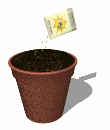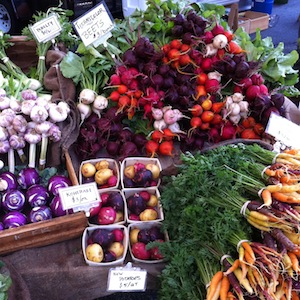Localize Your Lifestyle!
by Mary Louise;Town Jaqua, Health Minister - 5/8/15There is something about experiencing life
up-close-and-personal. It is a quality of life that
can not be imported nor can it be purchased with
money. It is a quality of life called living simply,
in the moment as it were. Such simple moments,
though standing before us, often go unnoticed;
yet they are there in wonderful splendor, waiting
to be discovered, enjoyed, appreciated! Such is
the way that life blossoms, if we will but let it happen,
and let it happen naturally!For all the recent popularity about natural living and
thinking locally, this way of life is not new. Our
ancestors practiced local living for thousands of
years. They knew no other way to live. They built
their own houses, cultivated their own land, grew
their own food, schooled their own children,
forged their own tools, and made their own clothes.
Traveling from one place to another meant walking
or riding a horse. They were 'rugged individualists'
who had a vision of a better quality of life and despite
many challenges, were not afraid to pursue it.This 'pioneer' lifestyle is what built America and
made it great. Living off the land proved to be the
backbone of our nation, an agrarian way of life that
was noble, affordable, and prosperous. Given the
bounty of natural as well as human resources, our
forefathers enjoyed a quality of life that was
profoundly simple and healthy!Regaining the naturally healthy heritage that we
once enjoyed as a nation is not only possible but
is in progress! The last few decades have seen a
revival to 'return to the land.' Likewise, 'discovering
one's roots' has gained steady momentum. Without
a doubt, the connection between living naturally and
locally as being the key to experiencing life in the
fullest has now become a major movement in
America!Reinventing the local life
Improving quality of life is a lesson in refocusing
our thoughts and actions. Achieving a happier,
healthier life is a matter of personal choice,
expressed in terms of reformation: eliminating
bad health habits and replacing them with good
habits. Though the principles of optimum health
are simple, implementing them can be challenging.
However, transitioning into a healthier life is often
made easier by taking advantage of local resources.
Given the right contacts, it can be surprisingly fun
and most of all rewarding!
1. Plant a garden
Gardening is a good way to reconnect with the
land and rediscover real food, i.e. living foods.
Experiencing the growing process teaches one
valuable life lessons that are rewarded both
naturally and spiritually: food that sustains body
and spirit. A home garden also provides food
security. Learning to cultivate the land, tend crops,
harvest, prepare, preserve, and store food fosters
good health. If land, time or personal effort is in
short supply or not possible, consider gardening
with a family member, friend or neighbor. Sharing
the garden tasks and harvests is a win-win for all.
Community gardens are also a good option.
Many towns now have prepared garden plots for
residents. Inquire to see if your town has a
community garden program. Container or raised
bed gardens are also viable growing strategies
for the would-be/want-to-be gardener. On a
smaller scale, window sill gardening and
indoor sprouting are simple, easy solutions
for growing nutrient-rich foods at fingertip level!2. Forage for food
Believe it or not, food can be found in your
own backyard! Plants such as dandelion,
plantain, nettles, and clover are edible and
make healthy additions to smoothies and
salads. For optimum nutrition, juice them!
If you lack a backyard, find a local spot
to pick dandelions and other wild assorteds.
Be sure to harvest in chemical-free areas
well distanced from the road. For the more
adventurous, forage for food in a local
forest! There is an abundance of nutritious
food that grows on the forest floor and in/on
trees. Yes, trees are edible!
3. Shop Farmers' Markets
If home gardening or foraging for food is not
your inclination or style, buy organics from
professional growers. Local Farmers' Markets
are an excellent venue for the health-conscious.
Weekly or semi-weekly markets afford access
to fresh, mostly organic produce at reasonable
prices from early spring to late fall. Many Farmers'
Markets continue into the winter months, though
fresh produce availability is rare. Farm fresh foods
in season are also offered through programs such
as Subscription Farming (custom growing),
Community Shared Agriculture (CSA's), and
government Farm Shares (for low-income
signees). To make their products more accessible
to those with low income, most farmers now accept
food stamps. Likewise, many farms offer a U-Pick
option, especially during berry and apple season,
which is a wallet-friendly way to buy for those on
limited budgets. Likewise, at the end of the growing
season, some farmers welcome gleaners to comb
their fields for left-over harvesting.
4. Shop local, natural food stores
Natural food stores have been around for several
decades, providing healthier (often local) choices
in fresh, frozen, packaged, and bulk foods. This
venue has proven successful for promoting healthier
options for the average public. Local Cooperatives
have also been around for many years, offering product
discounts to members. Likewise, community markets
are becoming more common. These local markets
typically offer fresh produce in season plus a variety
of bulk foods, non-food items, salad bars/deli food,
local arts and crafts, and more. If none of the above
venues exist in your locale and you want to shop
organics, larger local supermarkets have health-food
sections and many carry locally-grown produce in
season. Inquire of the produce manager for product
availability. Otherwise look for PLU stickers on
displayed produce that begin with #9, signifying
organically grown.5. Find a local spring
A source of safe drinking water is imperative for
the health of the body. Since tap water is unsafe
for human consumption, finding alternative solutions
for drinking water is a priority. While many people
opt to purchase bottled water or invest in home
water purification systems (such as distillers,
reverse osmosis, gravity-fed systems, etc.),
quality drinking water can be obtained free of
charge at a local spring. Because spring water
rises out of the ground by its own volition, it is
considered by many health experts to be the
best quality of water to drink. With a little
investigation, local springs are usually not
difficult to find nor are they necessarily far away.6. Network locally
Find others in your area who actively pursue
a healthy lifestyle and network with them. Share
information, have gatherings, and go places
together. Support one another in building a
better quality of life.7. Discover local trails
Many communities have walking trails that
wind the local landscape in a picturesque
manner. These pathways are an excellent
opportunity for locals to combine exercise
with natural beauty. A walk in the woods or
along a river bank invigorates body and
spirit. Find a nearby trail or a park that
inspires you to stretch your legs!8. Vacation locally
'Getting away from it all' need not require
long trips to far away places. The number
of historic, cultural, and social opportunities
that exist in a local setting is surprisingly
many and varied. Many towns have reclaimed
their historical heritage, hold festivals, offer
tours, and vacation packages that cater
to individuals and families. With increased
costs related to traveling, local day trips
could prove to be the best way to 'get
away from it all.' For added adventure, book
a local campground and enjoy the sights!Benefits of localizing your lifestyle
Thinking and acting locally improves quality
of life in many ways. Some of the benefits
include:
- Convenience
- Thrift- home gardening saves money
- Food quality- locally grown food is fresher
and thus has more nutrient value than food
that is transported across the country or
imported from around the world.- Food safety/security- because of proximity
and agricultural standards, locally-grown
food is a more reliable and safer food source.- Water- drawing water from local wells or springs
is purer and therefore safer/healthier than most
bottled water.- Improves the local economy- supporting local
agriculture and industry improves the local
economy by keeping money within the community
which in turn helps to keep prices down.- Encourages and improves community relations-
healthy communities are the product of home
or family- based businesses that typically offer
higher quality products with personalized service,
while large discount stores are often owned and
operated by foreign corporations.In conclusion
Living well within local resources is a simple,
creative venture that is both possible and rewarding.
It is a discovery process that involves meeting
others of like mind and sharing valuable human
resources that contribute to a healthy quality of
life for everyone. Thinking local and supporting
those who contribute to making a local lifestyle
successful builds personal as well as community
strength.That the true American way of life has been all
but swallowed up by a global mentality is fact.
Intrigue with things foreign and far away has
eroded our identity and sense of place. It is
time to reclaim our roots in a home grown way,
the way it used to be and should be. For the
sake of our better health as a people and a
nation, we need to prove and improve our
local lifestyle so that we can likewise help
others 'bloom where they are planted.' Thus,
living 'up-close-and-personal' on a local level
is more than just a cliche. It is reality!
Ask, and it shall be given you;
seek, and ye shall find; knock,
and it shall be opened unto you:
Matthew 7:7__________________________________
For references and further research
visit
LIVING Resources,
LIVING Garden,
LIVING Buying Tips

